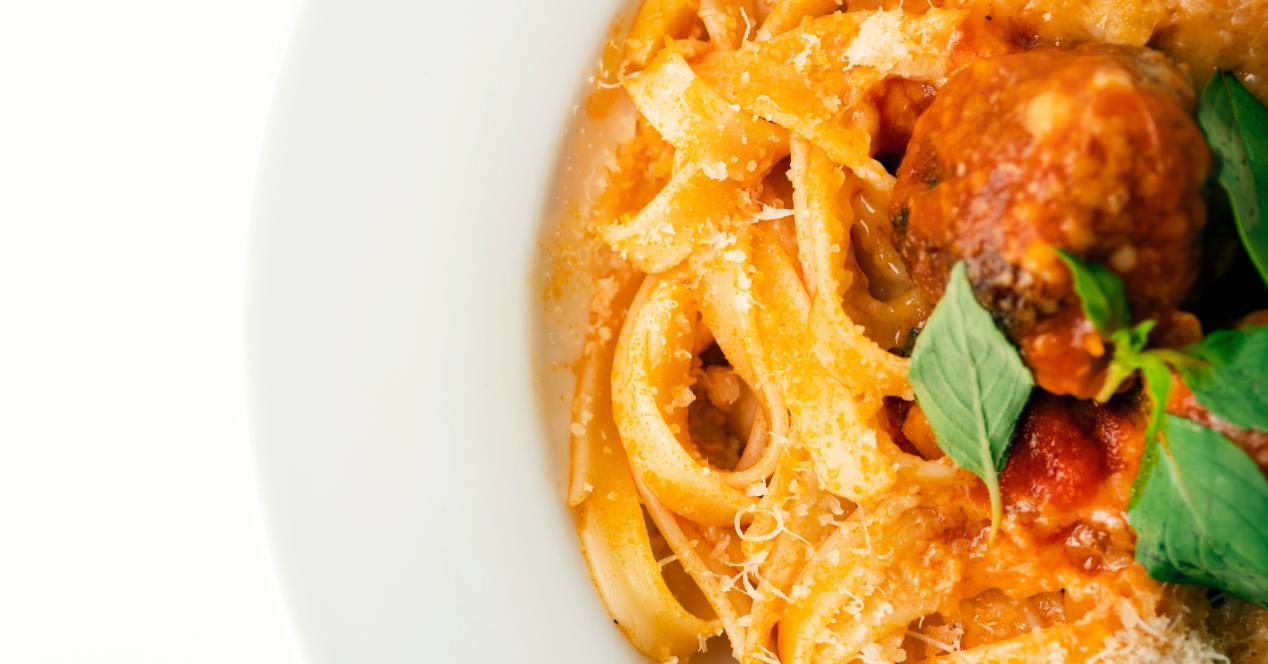
There's nothing like a comforting, piping hot bowl of spaghetti and meatballs. But the truth is, we could all benefit from eating a little less meat. There are healthier alternatives you can make into a family meal that transforms a calorie-laden dinner into a nutritious, plant-based meal that everyone will enjoy. For example: vegan meatballs.
Today we bring you a delicious meatless dish for traditional meatballs. It's just as hearty and satisfying as its beefy counterpart. The best part is that it's packed with nutrients, and you can whip up the recipe in 45 minutes or less.
Traditional meatballs are typically made with beef, pork, turkey, or a combination of these meats. While eating meat in moderation is totally fine, most recipes call for fatty cuts so the meatballs stay juicy and soft. Not to mention, the meatballs are often first fried in oil and then finished in the oven, adding even more calories to the dish.
I guess we could call them a hybrid of vegan meatballs, falafel, and veggie burgers. They start out as a simple mix of sautéed onion, bell pepper, garlic, and chickpeas, and we blend them in a food processor with sun-dried tomatoes, thyme, and oregano for a Mediterranean flavor. In the end we will have a meal with easy plant based protein and flavors.
Why are they healthy?
Vegan chickpea meatballs are so much healthier than traditional beef, turkey, or even store-bought meatless meatballs. The ones in this recipe are recommended for the following reasons:
- Low Fat: These chickpea meatballs have less than 6 grams of fat for a 4-meatball serving. Compared to meatballs, that's more than half the fat.
- High in fiber: One serving (4 meatballs) has 43% of the recommended fiber. This fiber comes from chickpeas and flax seeds.
- Low in calories: A serving of chickpea meatballs has less than 300 calories.
- Oil-Free – They do not require any oil, making them oil-free, plant-based whole foods.
- Gluten Free: These meatballs are not made with breadcrumbs like many other meatballs. Instead, we'll use gluten-free oats to bind the ingredients together.
- All Natural Ingredients – Unlike the meatless meatballs we can buy in the frozen section of the supermarket, all the ingredients in these meatballs are raw, plant-based. There are no processed ingredients, binders, or isolated soy protein.
Nutritional value
What makes these vegan meatballs a smart swap is that they are packed with plant-based protein, fiber, and healthy fats that will not only taste good, but also make you feel good.
The recipe opts for chickpeas, which are a good source of protein for filling and an excellent source of fiber. Both the linseed as nuts they make a cameo appearance in these plant-based meatballs.
Flaxseeds and walnuts contain a vegetable source of fatty acids Omega-3, which have been linked to providing anti-inflammatory effects in the body and supporting heart health. Not to mention, a cup of walnuts adds a whopping 8 grams of fiber to this recipe.
In addition to the chickpeas, flaxseeds, and walnuts, you'll be incorporating oats into this recipe. The oats are 100 percent whole grain and contain magnesium, phosphorus and vitamin B1.
As for the sauce, you can expect a good dose of lycopene Thanks to the tomatoes. Lycopene is an antioxidant that is associated with helping protect against certain chronic diseases like heart disease and cancer.

Tips for cooking
There are some recommendations to make these vegan meatballs as perfect as possible. Especially if we decide to do them for the first time.
- Swap the flaxseed for chia seeds If you prefer. It will allow the mixture to stick more easily, so you can use either one in the recipe.
- Fry meatballs or air fry them for a crispier texture. Be sure to use a non-stick pan if you are going to do shallow frying, as the mixture can stick to the pan.
- Add density by adding mushrooms. Mushrooms have a great meaty flavor and can be easily incorporated for a more elastic texture.
- Put the meatballs in the marinara just before serving. Otherwise, the texture of the meatballs may soften as they absorb the liquid from the marinara sauce.
- Be sure to drain and rinse the chickpeas if we use them from a can. If we don't do this, the chickpea meatballs will fall apart.
- After combining all the ingredients in the food processor, you should have a sticky consistency.
- If the chickpea mixture is too wet, we can add a little more ground oats to help absorb the moisture.
- If we want to prepare a large quantity of chickpea meatballs to have on hand during the week, we can freeze them in an airtight container. They will last 2-3 months in the freezer.
- We can shape the balls up to 1 day in advance and store them in the fridge until we are ready to bake them. Leftover meatballs will keep for up to 5 days in the fridge.
How to serve them?
We can serve these vegan meatballs with an oil-free marinara sauce and our favorite pasta. It is recommended that it be whole wheat pasta, chickpea pasta or lentil pasta. We will avoid using traditional white pasta, as it will turn into sugar. Whole wheat pasta, chickpea pasta and lentil pasta are digested more slowly due to their natural fiber.
However, we can also accompany them with whole wheat bread. Instead of shaping them into round shapes, we can flatten the mixture and tuck it between a whole wheat bun to make a delicious meatless meatball sandwich.
And, of course, they can be accompanied by steamed vegetables or a salad. We'll serve them with a side of steamed vegetables or a mixed green salad with an oil-free dressing.